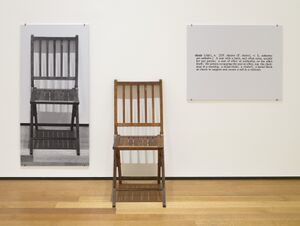User:Aitantv/FISTING
What is
Multimedia presentation of a mound of clay being fisted. The piece consists of three depictions of clay fisting: live action, 3D rendering, and live performance. Fisting is an accidental direct reference to Joseph Kosuth's 'One & Three Cahirs' (1965).
Critiques
- the image processing level correlates with audio processing, so the live is the most 'honest' while the 3D is the most augmented
- the three performances can be spontaneous and on their own, not in sync. This way the whole is less deterministic, more spontaneous
- a direct reference to ASMR
- the real live performance could be the most uncanny, the most processed and augmented
- aren't we beyond beyond post conceptual art? Maybe personality is actually what we need? Maybe colour and form is liberating given our apocalytpic lived reality. Perhaps we need something we can connect with. Maybe the simplicity of the clay kneeding offers this. What is it about the action of kneeding the wet clay that excites me? Is it a body? It is flesh. It is dynamic, changeable, tactile, tangible, mobile, dense, soft, hard, slow, glacial to solidify.
- There's an underlying wanting to get closer to physical reality, while always being two steps removed. Is it possible to really find clay in media? Or to make clay more than clay.
Research
Joseph Kosuth, Wiki
- Joseph Kosuth, "Art is not a question of forms and colors but one of the production of meaning."
- His activity has consistently explored the production and role of language and meaning within art.
- stripping art of personal emotion, reducing it to nearly pure information or idea and greatly playing down the art object
- 1966 Kosuth also embarked upon a series of works entitled Art as Idea as Idea, involving texts, through which he probed the condition of art.
- Kosuth forwards tautological statements, where the works literally are what they say they are.
- he spent time in the Trobriand islands with the Aboriginal tribe that Malinowski had studied and wrote on. From Kosuth's point of view, " I knew I could, would, never enter into their cultural reality, but I wanted to experience the edge of my own." It was this experience and study which lead to his well-known text ‘The Artist as Anthropologist’ in 1975.

